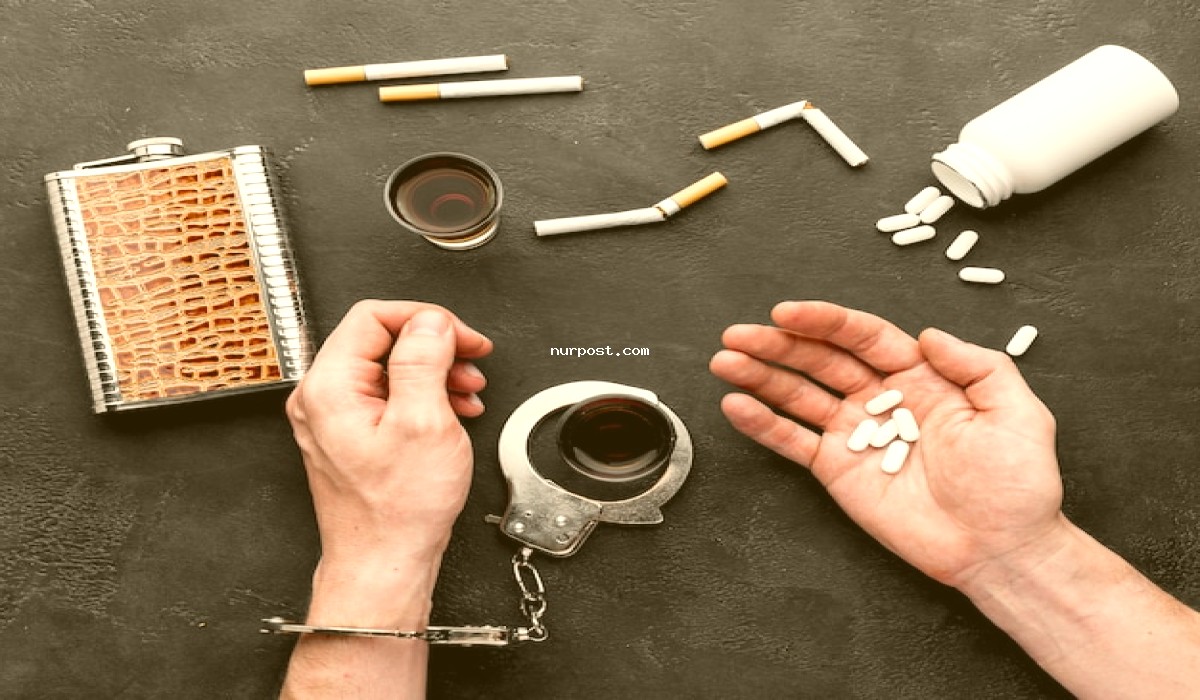How To Quit Any Addiction? Addiction is a complex and difficult challenge that millions of people struggle with every day.
How To Quit Any Addiction
Whether it’s alcohol, drugs, gambling, or any other vice, addiction can have a devastating impact on individuals, families, and communities. However, with the right approach and determination, anyone can overcome their addiction and live a fulfilling, healthy life. In this article, we will discuss 25 powerful steps that can help you break free from any addiction. So, let’s get started.
**Table of Contents**
|Sr# |Headings|
|—-|—————-|
|1.|Understanding Addiction|
|2.|Admitting the Problem|
|3.|Finding a Support System|
|4.|Identifying Triggers|
|5.|Creating a Plan|
|6.|Setting Goals|
|7.|Making Lifestyle Changes|
|8.|Limiting Exposure|
|9.|Replacing Negative Habits|
|10.|Practicing Mindfulness|
|11.|Seeking Professional Help|
|12.|Participating in Therapy|
|13.|Exploring Different Therapies|
|14.|Joining Support Groups|
|15.|Taking Care of Your Body|
|16.|Finding Healthy Coping Mechanisms|
|17.|Learning How to Say No|
|18.|Setting Boundaries|
|19.|Avoiding Relapse|
|20.|Forgiving Yourself|
|21.|Managing Stress|
|22.|Finding Purpose and Meaning|
|23.|Surrounding Yourself with Positive Influences|
|24.|Celebrating Small Victories|
|25.|Embracing a New Lifestyle|
Understanding Addiction
Before embarking on your journey to quit any addiction, it is important to understand what addiction is and how it affects your brain and behavior. Addiction is a chronic disease that is characterized by compulsive drug seeking and use, despite the negative consequences. Addiction changes the brain in fundamental ways, making it difficult for individuals to control their cravings and resist the urge to use their drug of choice. This is why quitting an addiction can be such a challenging process.
Admitting the Problem
The first step towards quitting any addiction is admitting that you have a problem. It takes a lot of courage to face your addiction and acknowledge that it has taken control of your life. Often, people struggling with addiction may be in denial and refuse to admit that they have a problem. However, admitting the problem is the first step towards recovery.
Finding a Support System
Breaking an addiction on your own can be overwhelming and even impossible. Having a strong support system can make all the difference. Reach out to family, friends, or support groups for help and understanding. Surround yourself with people who are supportive and encouraging and avoid those who may trigger your addiction.
Identifying Triggers
Triggers are people, situations, or emotions that can lead to a relapse. Identify your triggers and develop a plan to avoid or cope with them. For example, if your trigger is attending parties where alcohol is present, consider finding alternative activities to do or bring your own non-alcoholic beverages.
Creating a Plan
A solid plan is crucial for quitting any addiction successfully. Sit down and write out a plan that outlines your goals, strategies for managing cravings, and ways to stay motivated. Remember to be realistic and include small, achievable goals to keep yourself motivated.
Setting Goals
Quitting an addiction can feel like an overwhelming task. It’s essential to set realistic and achievable goals for yourself. Start with short-term goals, such as staying sober for a week, and gradually work your way towards long-term goals, like staying sober for a year.
Making Lifestyle Changes
Breaking an addiction often requires making significant lifestyle changes. This could mean changing your social circle, finding new hobbies, or even changing your daily routine. Identify areas in your life that may need to change to support your recovery and make the necessary adjustments.
Limiting Exposure
It’s vital to limit your exposure to anything that may trigger your addiction. This could include avoiding certain places, people, or even activities that may lead you to relapse. If you know that seeing old friends who still use drugs will be a trigger, consider cutting ties or limiting contact.
Replacing Negative Habits
Breaking free from an addiction often means replacing negative habits with healthier ones. Instead of turning to your substance of choice whenever you feel stressed or anxious, try practicing deep breathing, going for a walk, or listening to music as coping mechanisms. Find alternatives that work for you and incorporate them into your daily routine.
Practicing Mindfulness
Mindfulness is a powerful tool for addiction recovery. By being present and aware of your thoughts and feelings, you can better manage cravings and urges. Mindfulness practices like meditation, yoga, or journaling can help you stay grounded and focused on your recovery.

Seeking Professional Help
Quitting an addiction can be a complicated and overwhelming process, and sometimes, professional help may be necessary. Seeking help from a counselor or therapist can provide you with the tools and support you need to overcome your addiction successfully.
Participating in Therapy
Therapy can be an effective way to address the underlying issues that may have contributed to your addiction. It can also help you develop healthy coping mechanisms and better manage any mental health issues you may be struggling with.
Exploring Different Therapies
Different therapies work for different people, and it’s essential to find one that works for you. Some options include cognitive-behavioral therapy, group therapy, or family therapy. Consider trying different approaches to find what works best for you.
Joining Support Groups
Support groups can provide you with a community of individuals who understand what you’re going through and can offer support and encouragement. Consider joining a support group specific to your addiction or a 12-step program like Alcoholics Anonymous or Narcotics Anonymous.
Taking Care of Your Body
Taking care of your physical health is crucial in addiction recovery. Eating a healthy diet, getting enough sleep, and exercising regularly can not only improve your physical well-being but also your mental health.
Finding Healthy Coping Mechanisms
An essential part of quitting any addiction is finding healthy ways to cope with stress and difficult emotions. This could include engaging in hobbies you enjoy, talking to a trusted friend or therapist, or practicing relaxation techniques.
Learning How to Say No
Saying no can be difficult, but it’s an essential skill to develop when overcoming any addiction. You may face social pressure from friends or family to engage in your former addiction, but it’s crucial to stay firm in your commitment to sobriety.
Setting Boundaries
Setting boundaries is a critical part of maintaining your sobriety. Communicate clearly and assertively with others about your needs and limits. Set boundaries that support your recovery and stick to them.
Avoiding Relapse
Relapse is common in addiction recovery, but it’s not a sign of failure. If you do experience a relapse, be kind to yourself and seek help and support to get back on track. Avoiding relapse requires a strong support system, a solid plan, and a commitment to your recovery.

Forgiving Yourself
Quitting any addiction is not an easy task, and it’s normal to experience setbacks. It’s important to forgive yourself and not be too hard on yourself if you face challenges or even relapse. You are on a journey, and mistakes are a part of the process.
Managing Stress
Stress is a major trigger for many people struggling with addiction. Finding healthy ways to manage stress, such as exercise, meditation, or talking to a therapist, can help you stay on track with your recovery.
Finding Purpose and Meaning
Addiction can often leave individuals feeling lost and without purpose. As you work towards quitting your addiction, think about what gives your life meaning and focus on those things. This can give you a sense of purpose and direction as you continue on your journey.
Surrounding Yourself with Positive Influences
The people you surround yourself with can have a significant impact on your recovery. Surround yourself with people who support your sobriety and who have a positive influence on your life.
Celebrating Small Victories
Quitting an addiction is a journey, and it’s important to celebrate small victories along the way. Set achievable goals and reward yourself when you reach them. This will help keep you motivated and remind you of how far you’ve come.
Embracing a New Lifestyle
Quitting an addiction means embracing a new lifestyle. This may mean letting go of old habits, finding new hobbies, and focusing on your well-being. Embrace the changes and look forward to a healthier, happier life without your addiction.
FAQs
How long does it take to quit an addiction?
Quitting an addiction is a journey, and the length of time it takes differs for everyone. It can take weeks, months, or even years to fully recover.
Can I quit an addiction on my own?
While it’s possible to quit an addiction on your own, it’s often helpful to seek support from friends, family, or a professional.
Will I experience withdrawal symptoms when quitting an addiction?
Withdrawal symptoms differ depending on the substance you’re addicted to, but they can range from mild discomfort to severe physical and mental symptoms. Seeking professional help can help you manage these symptoms.
Is it normal to experience relapse during addiction recovery?
Yes, relapse is common in addiction recovery, and it’s not a sign of failure. If you do experience a relapse, seek support and get back on track with your recovery plan.
How can I manage the cravings and urges to use my substance of choice?
Practice healthy coping mechanisms, such as engaging in hobbies, talking to a therapist, or practicing mindfulness, to manage intense cravings and urges.
Will my life change completely after quitting an addiction?
Quitting an addiction is a significant lifestyle change, but it also opens up new possibilities and opportunities for a healthier, happier life.
Can I still have a social life while in recovery?
Yes, it’s possible to maintain a social life while in recovery. However, it’s essential to set boundaries and avoid situations that may trigger your addiction. Seek support from friends and family who understand and support your recovery.
